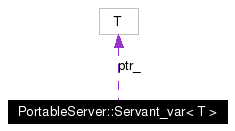
#include <Servant_var.h>
Collaboration diagram for PortableServer::Servant_var< T >:

Public Types | |
| typedef T | servant_type |
Public Member Functions | |
| Servant_var (T *p=0) | |
Constructor. Assumes ownership of p. | |
| Servant_var (Servant_var< T > const &rhs) | |
Copy constructor. Adds reference to rhs. | |
| Servant_var< T > & | operator= (Servant_var< T > const &rhs) |
Assignment operator. Adds reference to rhs. | |
| ~Servant_var (void) | |
| Servant_var< T > & | operator= (T *p) |
Assignment operator. Assumes ownership of p. | |
| T * | operator-> () const |
| Smart pointer operator-> provides access to the underlying object. | |
| T const & | operator * () const |
| Dereference the underlying object. | |
| T & | operator * () |
| Dereference the underlying object. | |
| operator void const * () const | |
| T * | in () const |
| As an IN parameter. | |
| T *& | inout () |
| As an INOUT parameter. | |
| T *& | out () |
| As an OUT parameter. | |
| T * | _retn () |
| void | swap (Servant_var< T > &rhs) |
Static Public Member Functions | |
| T * | _duplicate (T *) |
| Increment the reference count and return the servant. | |
Private Attributes | |
| T * | ptr_ |
Definition at line 41 of file Servant_var.h.
|
|||||
|
Definition at line 44 of file Servant_var.h. |
|
||||||||||
|
Constructor. Assumes ownership of
Definition at line 18 of file Servant_var.inl.
00019 : ptr_ (p) 00020 { 00021 } |
|
||||||||||
|
Copy constructor. Adds reference to
Definition at line 27 of file Servant_var.inl.
00028 : ptr_ (Servant_var<T>::_duplicate(rhs.ptr_)) 00029 { 00030 } |
|
||||||||||
|
This destructor doesn't throw exceptions. Definition at line 36 of file Servant_var.cpp.
00037 {
00038 // Unfortunately, there is no throw spec on _remove_ref, so we
00039 // can't assume that it will not throw. If it does, then we are in
00040 // trouble. In any event, we can't let the exception escape our
00041 // destructor.
00042 try
00043 {
00044 if (this->ptr_ != 0)
00045 {
00046 this->ptr_->_remove_ref ();
00047 }
00048 }
00049 catch (...)
00050 {
00051 // Forget the exception..
00052 }
00053 }
|
|
||||||||||
|
Increment the reference count and return the servant. It is safe to pass in a null pointer, the pointer is simply returned in that case.
Definition at line 18 of file Servant_var.cpp.
00019 {
00020 try
00021 {
00022 if (p != 0)
00023 {
00024 p->_add_ref ();
00025 }
00026 }
00027 catch (...)
00028 {
00029 throw;
00030 }
00031
00032 return p;
00033 }
|
|
|||||||||
|
Return a pointer to the underlying object, and this counted reference will no longer own the object. Definition at line 154 of file Servant_var.inl.
00155 {
00156 T * const rval = ptr_;
00157 this->ptr_ = 0;
00158 return rval;
00159 }
|
|
|||||||||
|
As an IN parameter.
Definition at line 131 of file Servant_var.inl. Referenced by TAO::Portable_Server::RequestProcessingStrategyDefaultServant::get_servant(), TAO::Portable_Server::RequestProcessingStrategyDefaultServant::id_to_servant(), TAO::Portable_Server::RequestProcessingStrategyDefaultServant::locate_servant(), TAO::Portable_Server::RequestProcessingStrategyDefaultServant::servant_to_id(), and TAO::Portable_Server::RequestProcessingStrategyDefaultServant::system_id_to_servant().
00132 {
00133 return this->ptr_;
00134 }
|
|
|||||||||
|
As an INOUT parameter.
Definition at line 138 of file Servant_var.inl.
00139 {
00140 return this->ptr_;
00141 }
|
|
|||||||||
|
Dereference the underlying object.
Definition at line 118 of file Servant_var.inl.
00119 {
00120 return *this->ptr_;
00121 }
|
|
|||||||||
|
Dereference the underlying object.
Definition at line 111 of file Servant_var.inl.
00112 {
00113 return *this->ptr_;
00114 }
|
|
|||||||||
|
Return a void pointer to the underlying object. This allows it to be used in conditional code and tested against 0. Definition at line 124 of file Servant_var.inl. References ACE_INLINE.
00125 {
00126 return this->ptr_;
00127 }
|
|
|||||||||
|
Smart pointer operator-> provides access to the underlying object. @ Ciju: The below member templates was commented out because: 1. gcc 2.95 doesn't support them. 2. Sun cc 5.8 member templates support is buggy (Bug Id: 6463114). Once these have been fixed a decision can be made regards uncommenting them. My own openion is that they shouldn't be used since making implicit constructors, member templates, you could potentially get an unwanted conversion where one was unwarranted. Definition at line 104 of file Servant_var.inl.
00105 {
00106 return this->ptr_;
00107 }
|
|
||||||||||
|
Assignment operator. Assumes ownership of
Definition at line 43 of file Servant_var.inl. References PortableServer::Servant_var< T >::swap().
00044 {
00045 if (this->ptr_ != p)
00046 {
00047 // This constructor doesn't increase the reference count, nor is
00048 // it a copy constructor, so we must check for self-assignment.
00049 // Otherwise the reference count would be prematurely
00050 // decremented upon exiting this scope.
00051 PortableServer::Servant_var<T> tmp (p);
00052 this->swap (tmp);
00053 }
00054
00055 return *this;
00056 }
|
|
||||||||||
|
Assignment operator. Adds reference to
Definition at line 34 of file Servant_var.inl. References PortableServer::Servant_var< T >::swap().
00035 {
00036 PortableServer::Servant_var<T> tmp (rhs);
00037 this->swap (tmp);
00038 return *this;
00039 }
|
|
|||||||||
|
As an OUT parameter.
Definition at line 145 of file Servant_var.inl. References PortableServer::Servant_var< T >::swap().
00146 {
00147 PortableServer::Servant_var<T> tmp;
00148 this->swap (tmp);
00149 return this->ptr_;
00150 }
|
|
||||||||||
|
Non-throwing swap operation. Often used to implement strong exception safety. Definition at line 11 of file Servant_var.inl. References PortableServer::Servant_var< T >::ptr_. Referenced by PortableServer::Servant_var< T >::operator=(), and PortableServer::Servant_var< T >::out().
00012 {
00013 std::swap (this->ptr_, rhs.ptr_);
00014 }
|
|
|||||
|
Definition at line 150 of file Servant_var.h. Referenced by PortableServer::Servant_var< T >::swap(). |
 1.3.6
1.3.6